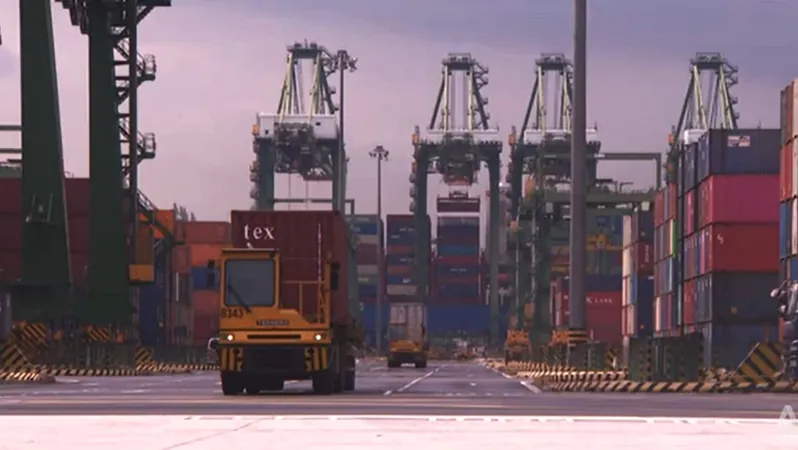
Preparing for 2025: How Singapore Port Operators and Manufacturers are Combatting Supply Chain Vulnerabilities
2024-12-13
Author: Li
SINGAPORE: Mitigating Supply Chain Disruptions
In an effort to mitigate potential supply chain disruptions, port operator PSA Singapore is stepping into the future with cutting-edge technology. As part of its ambitious project to establish the world's largest fully automated port by 2040, PSA is enhancing its operations at Tuas Port with a substantial 5G upgrade. This upgrade involves deploying automated vehicles capable of real-time cargo tracking from berths to ships, with collaboration from telecommunications giants Singtel and Ericsson.
Technological Advancements for Efficiency
These technological advancements aren't just for show; they are designed to bolster efficiency and reduce downtime. Over the next three years, PSA aims to kickstart 5G applications in predictive maintenance, utilizing tools like drone surveillance and extended reality systems to spot potential issues before they escalate, thus improving operational productivity.
Learning from Past Disruptions
These enhancements become particularly significant in light of past disruptions that rattled the industry, such as the shocking Red Sea attacks earlier this year. When shipping routes were compromised, vessels that traditionally docked in less than a day experienced waits of up to a week in Singapore.
Manufacturers Adapting to Technological Trends
As we edge closer to 2025, local manufacturers in Singapore are also doubling down on technology adoption to secure their supply chains against unexpected shocks. According to Associate Professor Goh Puay Guan of the National University of Singapore Business School, companies must brace themselves for geopolitical tensions, the need for supply chain diversification, and the rapid evolution of technology, including artificial intelligence.
Concerns over Renewed Tariffs
Recent developments suggest that renewed tariffs under the incoming U.S. administration—led by former President Donald Trump—could further complicate matters. Trump has proposed significant tariffs on major trading partners Canada, Mexico, and China, signaling a potential slowdown in international trade. His plans include a 25% tariff on imports from Canada and Mexico and an additional 10% tariff on Chinese goods, which could disrupt supply chains and lead to increased shipping rates.
Potential Impacts on Import Patterns
In anticipation of these changes, U.S. companies may start stockpiling goods, causing temporary spikes in imports. This, in turn, could lead to more volatility in shipping rates as firms scramble to adjust to the new economic landscape.
Operational Challenges for Local Manufacturers
The implications of these shifts are particularly dire for local manufacturers that rely on imported raw materials or overseas production. Melvin Tan, president of the Singapore Manufacturing Federation, warns that companies producing for the U.S. market and sourcing materials from less-favored nations may face serious operational challenges. He points out that increased costs for raw materials will likely reduce Singapore's global competitiveness.
Turning to Technology for Supply Chain Management
In light of potential tariff hikes and market uncertainties, many firms are turning to sophisticated technologies for improved supply chain management. Companies like Epicor Software are providing solutions that enable businesses to predict demand, track shipments, and efficiently manage inventory. Lorraine Wee, Epicor’s country manager for Singapore and the Philippines, emphasizes that security and sustainability are paramount for firms today.
Cloud Solutions for Enhanced Operations
"We're seeing a significant shift toward cloud solutions," Wee notes. "This openness allows companies to implement technologies rapidly without dealing with cumbersome infrastructure issues, while also enhancing their capacity to manage sustainability through integrated carbon data for reporting and analytics."
Proactive Approach to Future Challenges
As both operators and manufacturers clash with future uncertainties, their commitment to technological innovation will play a pivotal role in safeguarding operations against inevitable global challenges. The advancements underway in Singapore signal a proactive approach in mitigating risks ahead of the anticipated 2025 landscape, setting a benchmark for global supply chain resilience.

 Brasil (PT)
Brasil (PT)
 Canada (EN)
Canada (EN)
 Chile (ES)
Chile (ES)
 Česko (CS)
Česko (CS)
 대한민국 (KO)
대한민국 (KO)
 España (ES)
España (ES)
 France (FR)
France (FR)
 Hong Kong (EN)
Hong Kong (EN)
 Italia (IT)
Italia (IT)
 日本 (JA)
日本 (JA)
 Magyarország (HU)
Magyarország (HU)
 Norge (NO)
Norge (NO)
 Polska (PL)
Polska (PL)
 Schweiz (DE)
Schweiz (DE)
 Singapore (EN)
Singapore (EN)
 Sverige (SV)
Sverige (SV)
 Suomi (FI)
Suomi (FI)
 Türkiye (TR)
Türkiye (TR)
 الإمارات العربية المتحدة (AR)
الإمارات العربية المتحدة (AR)